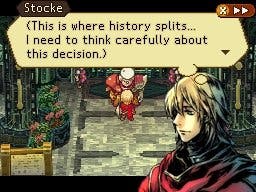DS Imports: The Last Hurrah
Radiant! Zombie! Monster!
Radiant Historia review
Whenever anyone complains about the decline of the Japanese role-playing genre, you can be assured they don't own a DS. Nintendo's handheld has played host to many of the finest JRPGs of the generation, and it's no exaggeration to say that Radiant Historia belongs among the upper echelons.
It breaks with JRPG convention immediately by putting you in the shoes of a character that seems fully-formed already. A far cry from the wide-eyed orphan norm, Stocke is more like a deuteragonist in a lead role, the cocky and slightly aloof older fighter who softens as the game progresses. The rest of the cast are well-rounded, too, niftily sidestepping genre cliché.
There is still a world that needs saving, of course. With most of the land claimed by desertification (a phenomenon apparently determined to create the universe's biggest beach), two factions are battling over the remaining fertile land. After witnessing two of his comrades killed in battle, Stocke manages to travel back in time with the help of a magical book to rewrite the past, creating two parallel timelines where actions in one resonate in the other.

The idea of being able to rewrite past wrongs is a seductive but hardly uncommon one and while Atlus gets some mileage from the concept, it can't quite disguise the game's linearity. Certain elements don't quite add up, either - once you start examining timeline inconsistencies, the whole thing starts to fall apart. If you don't think too hard and just go with the (irregular) flow, you'll likely enjoy the dramatic effects your choices can have. The early sequence where Stocke rescues a spy from a volley of arrows only he knew was coming is just one of a number of moments designed to make your hairs stand on end.
A few of the goosebumps come courtesy of the fabulous score from RPG veteran Yoko Shimomura, who provides a string of stirring themes throughout. Graphically, it doesn't fare quite so well - the 2D character art is decent, but outside the shifting Escher-meets-Hogwarts staircases of Historia (the place where timelines intersect) environments are a little nondescript, as fairly basic character sprites skate unconvincingly across them.
Yet if presentational shortcomings betray budgetary constraints, the brilliant grid-based battle system shows lack of funds needn't mean lack of imagination. Push attacks guide enemies from front to rear, reducing their damage output, while nudging several into the same square lets basic attacks hit multiple foes. Shifting turn order allows you to stack up attacks to deliver powerful combos but leaves your defences down while you wait to strike. It's rife with tactical opportunities, and the atypically brisk pace - even the default movement speed is a sprint - means you'll relish every encounter.
Radiant Historia might lack the breadth and polish of Dragon Quest IX or the contemporary chutzpah of The World Ends With You, but in its own way, it's every bit as memorable and fully deserves its place alongside them at the top table of DS role-players.
9/10
